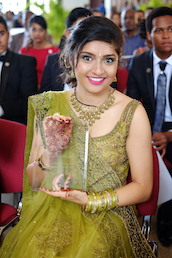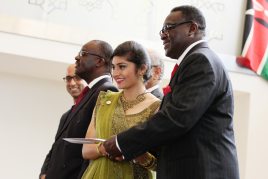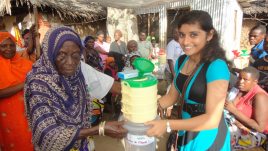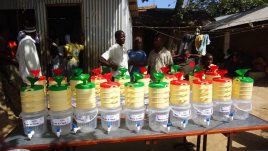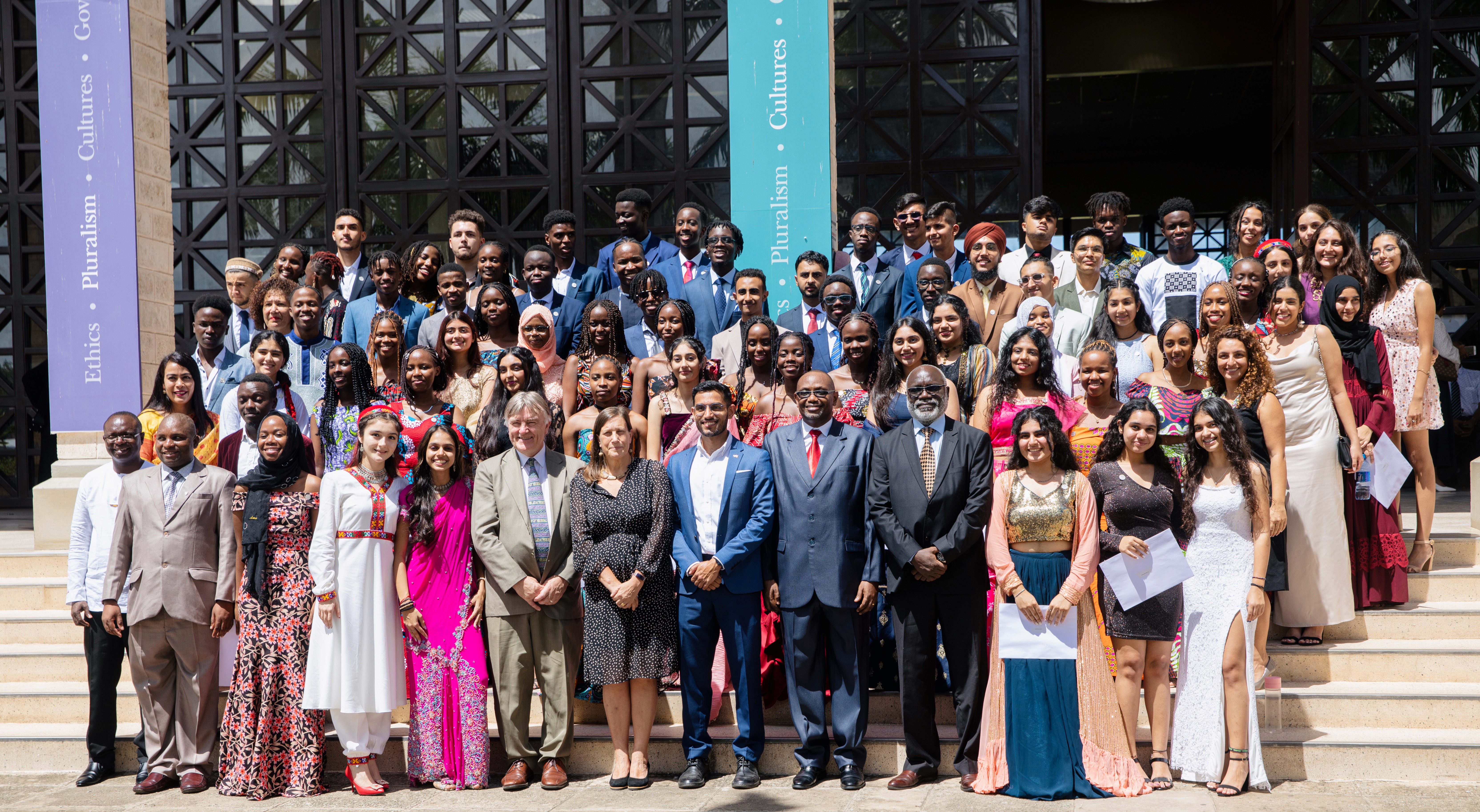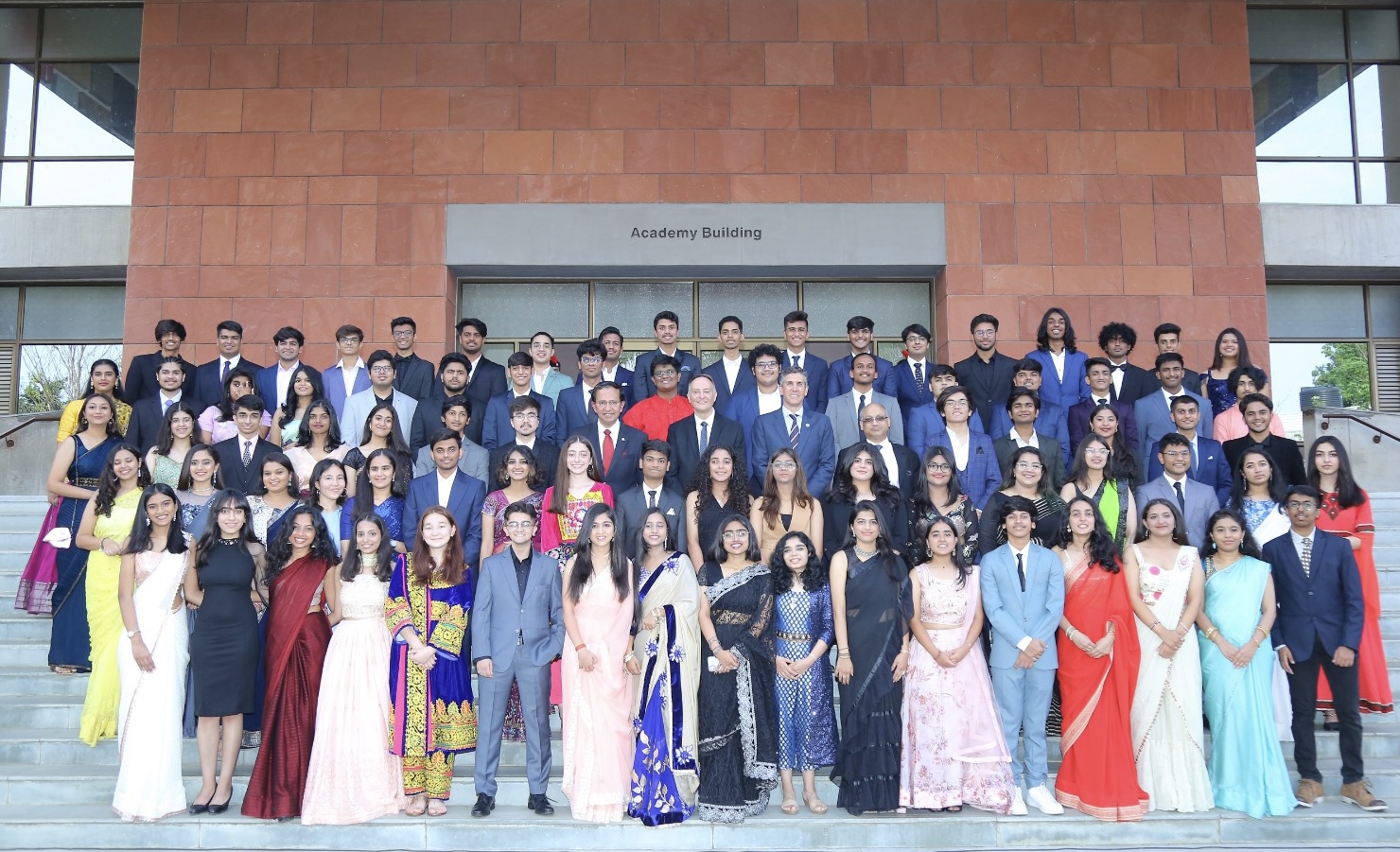Karishma Bhagani (Class of 2015): Making a splash for clean water
Look below for a video of Karishma speaking at the Passion in Science Awards.
Last year, 20-year-old Karishma Bhagani of Mombasa, Kenya was awarded a seed grant at the NYU Reynolds Changemaker Challenge, beating out eight other teams and 46 other projects. Bhagani won the seed grant for an innovative water purification system that makes the most of natural resources in cash-strapped communities that need clean water. Her initiative, Matone De Chiwit, came about as a solution to a problem she noticed: more and more diseases were emerging as a result of fluctuating weather in the country, ranging from floods to drought conditions. She knew that something had to be done.
Matone De Chiwit means “drops of life” in three different languages. Matone means drops in Kiswahili (Kenya), de means “of” in Spanish (Latin America) and chiwit means “Life” in Thai (Thailand). These three languages represent the three parts of the world that suffer the most from clean water scarcity. It also speaks to the global nature of her venture, as Bhagani intends to expand her project to these three regions and beyond.
Aga Khan Academy as an Inspiration
Bhagani is a fourth-generation Kenyan who recently moved to New York City where she is studying drama, history and South Asian studies at New York University. The Aga Khan Development Network has always been a part of her life as she was one of 17 students at the Aga Khan Academy in Mombasa who made up the first class to have been educated from pre-school to IB graduate.
The biggest lesson that Bhagani drew from her education is to be a holistic student. She strives to be as well rounded as possible, striking a balance between a social life, sleep, work and school, all with the goal of making a global impact. This pursuit of balance was inspired by her many years at the Aga Khan Academy.
“I think that at the end of the day what everything comes down to is how we can be citizens of the world and how we can change the world that we live in to make it a better place for ourselves and children that follow us. And part of that also means giving back to your own community,” said Bhagani.
When she was in middle school, she was required to carry out a personal project on something that inspired her. Having noticed the drastic fluctuations of weather and rampant diseases in her country, Bhagani decided that she would come up with an innovative water purification system that uses readily accessible natural resources. Her initiative uses locally available materials – sand, gravel, charcoal and cotton cloth – to purify water for villagers all across Kenya. The initial version of the product also used chlorine tablets called Aquapur. Bhagani received generous sponsorship funding from Davis & Shirtliff, a local water supply company, for donating 20 units to a community to test for effectiveness. “A lot of the families said that the water was ‘tamu sana’ which in English means very sweet,” said Bhagani.
Before Bhagani came up with her product, local families were typically just drinking untreated water, using a lot of energy to boil it on charcoal-heated stoves or using Aquapur chlorine tablets.
Testing and Improving
Through testing and implementation in villages, Bhagani and her partners came to the realization that using chlorine in a plastic container might not be the best idea. These tablets can actually be dangerous to human health — high doses can be potentially harmful as the plastic in the bottles reacts with the chlorine, resulting in the spread of more serious illnesses. So they decided to change it to moringa oleifera, essentially dried seed kernels of drumstick tree powder. Then, she carried out a lot of testing by collaborating with the Coast Water Services Board. She found that the new version worked just as well as the chlorine unit did.
When she was in the IB program at the Academy, she had the opportunity to take her unit to the Golden Climate International Environment Project Olympiad. That’s where she carried out even more research and testing to modify and improve the system. Her project ended up advancing to the national round, then the international round, where she won gold in its category.
It was at this point that she decided to patent the product. She applied before starting at NYU and received the patent while she was a first-year student.
Why Matone De Chiwit?
What sets Matone De Chiwit apart from competitors is that the device is both chlorine-free and cost-effective. Since it’s made up of natural resources common in rural Kenya and other parts of Africa, they can be replaced easily, which means users don’t have to rely on Matone De Chiwit to replenish the filter. Charcoal is easily found and other ingredients, like the drumstick tree powder, can be grown in their backyards. Additionally, Moringa olifeira grows in a variety of climates and doesn’t need much water to grow.
In terms of cost, it’s much cheaper in the long-term than what is currently used. Even so, Bhagani intends to ensure it’s affordable for rural villages by applying for sponsorship and grant funding from large companies all over Europe and North America. Her venture is also bridging the gap from the city to the village, because she is working with people from each of those communities and bringing them together to achieve clean water and sanitation for all.
The Future
With the seed grants that Bhagani recently received, including the Reynolds grant, she plans to carry out her first beta testing. The biggest challenge for her at the moment is having an adequate source of funding to collect data.
“It’s kind of a chicken-and-egg situation because we need more evidence of this product working in practicality in communities so that we can apply for more grants to sustain us, but without the grants it’s difficult to go out into the communities to actually grow these projects with that seed money,” said Bhagani.
With the little funding that she currently has received, she plans to establish the purifiers in at least two or three communities. Bhagani will continue checking on the units to get enough data so she can apply for larger grants and potentially work with philanthropies like the Gates Foundation. She also hopes to conduct more research on its effectiveness through beta testing in communities.
“In five years’ time, I hope to have conducted at least ten beta tests in Mombasa, and have expanded the venture all across Kenya. My intention is to begin applying for larger grants by that time so that we can expand to other countries around the world,” said Bhagani.
Additionally, she plans to collaborate with other Aga Khan academies in Hyderabad, India and Maputo, Mozambique. That collaboration could build on student organizations that can work with the rural communities that they already engage with.
Her long-term plan is to create a sustainable community, which not only bridges the urban/rural divide but also allows families to provide for themselves.
This spotlight is republished courtesy of AKF USA.
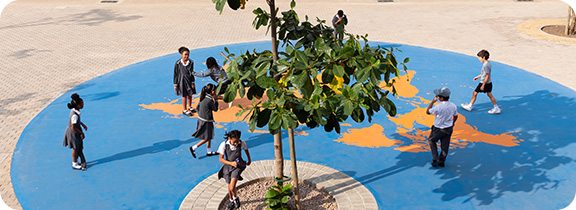
Why Choose the Aga Khan Academy Maputo
Admission to the Aga Khan Academy Maputo is based on merit. This is broadly defined as exceptional intellectual potential, leadership, a commitment to learning, a strong sense of integrity, and the desire to work towards and instigate positive change.
As part of a network of Academies, we aim to provide exceptional students, from all backgrounds, with an outstanding education.
We seek students representing a diverse range of economic, cultural, ethnic and religious backgrounds. We look for students who have the ability and motivation to excel academically and who are or will be capable of demonstrating leadership in community service and other co-curricular pursuits.
"But above all, it is my hope that these schools will stimulate creativity, intellectual curiosity and honest inquiry so that their students can adapt and thrive in a world of rapid change; can make informed judgements on life’s daily challenges, and place those judgements in an ethical framework."We are more than just schools that strive to give their students a sound academic foundation. We emphasise the importance of academic excellence while instilling in students a sense of civic responsibility and the desire, ability and commitment to give back to their communities locally and globally.
Our educational approach measures success not just by academic achievement, but how students apply what they know to make the world a better place.
The overall educational programme is designed to foster students’ curiosity while providing them with the skills and intellectual confidence to engage with what they do not know and find answers and solutions.
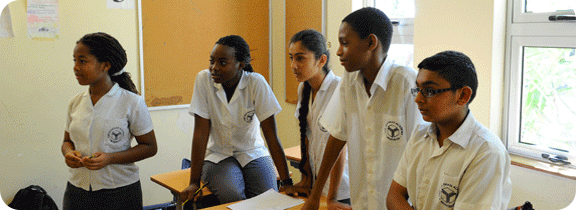
Why Choose the Aga Khan Academy Mombasa
Admission to the Aga Khan Academy Mombasa is based on merit. This is broadly defined as exceptional intellectual potential, leadership, a commitment to learning, strong sense of integrity, and the desire to work towards and instigate positive change.
As part of a network of Academies, we have been established to provide exceptional students from all backgrounds with an outstanding education.
We seek students representing a diverse range of economic, cultural, ethnic and religious backgrounds. We look for students who have the ability and motivation to excel academically and who demonstrate leadership in community service and other co-curricular pursuits.
We are more than just residential schools that strive to give their students a sound academic foundation.
We emphasise the importance of academic excellence while instilling in students a sense of civic responsibility and the desire, ability and commitment to give back to their communities locally and globally.
"In my view, the most important thing a student can learn in any educational institution is the ability to keep on learning."
Our educational approach measures success not just by academic achievement, but by how students apply what they know to make the world a better place.
The overall educational programme is designed to foster students’ curiosity while providing them with the skills and intellectual confidence to engage with what they do not know and find answers and solutions.
You can call the admissions team on their direct lines:
+254 (0) 736 200 008 or +254 780 223 703
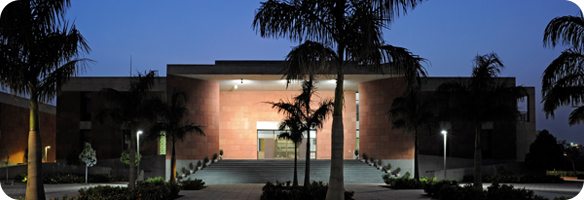
Why Choose the Aga Khan Academy Hyderabad
Admission to the Aga Khan Academy Hyderabad is based on merit. This is broadly defined as exceptional intellectual potential, leadership, a commitment to learning, strong sense of integrity, and the desire to work towards and instigate positive change.
As part of a network of Academies, we have been established to provide exceptional students from all backgrounds with an outstanding education.
We seek students representing a diverse range of economic, cultural, ethnic and religious backgrounds. We look for students who have the ability and motivation to excel academically and who demonstrate leadership in community service and other co-curricular pursuits.
We are more than just residential schools that strive to give their students a sound academic foundation. We emphasise the importance of academic excellence while instilling in students a sense of civic responsibility and the desire, ability and commitment to give back to their communities locally and globally.
"In my view, the most important thing a student can learn in any educational institution is the ability to keep on learning."
Our educational approach measures success not just by academic achievement, but by how students apply what they know to make the world a better place. The overall educational programme is designed to foster students’ curiosity while providing them with the skills and intellectual confidence to engage with what they do not know and find answers and solutions.
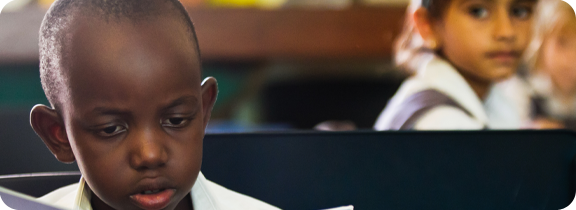
Why Choose the Aga Khan Academy, Dar-es-Salaam
Admission to the Aga Khan Academy, Dar-es-Salaam, is based on merit. This is broadly defined as exceptional intellectual potential, leadership, a commitment to learning, strong sense of integrity, and the desire to work towards and instigate positive change.
As part of a network of Academies, we aim to provide exceptional students, from all backgrounds, with an outstanding education.
We seek students representing a diverse range of economic, cultural, ethnic and religious backgrounds. We look for students who have the ability and motivation to excel academically and who are or will be capable of demonstrating leadership in community service and other co-curricular pursuits.
"In my view, the most important thing a student can learn in any educational institution is the ability to keep on learning."We are more than just schools that strive to give their students a sound academic foundation. We emphasise the importance of academic excellence while instilling in students a sense of civic responsibility and the desire, ability and commitment to give back to their communities locally and globally.
Our educational approach measures success not just by academic achievement, but how students apply what they know to make the world a better place.
The overall educational programme is designed to foster students’ curiosity while providing them with the skills and intellectual confidence to engage with what they do not know and find answers and solutions.
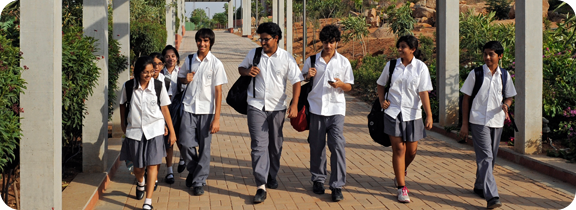
Why Choose the Aga Khan Academy Dhaka
Admission to the Aga Khan Academy Dhaka is based on merit. This is broadly defined as exceptional intellectual potential, leadership, a commitment to learning, strong sense of integrity, and the desire to work towards and instigate positive change.
As part of a network of Academies, we have been established to provide exceptional students from all backgrounds with an outstanding education.
We seek students representing a diverse range of economic, cultural, ethnic and religious backgrounds. We look for students who have the ability and motivation to excel academically and who demonstrate leadership in community service and other co-curricular pursuits.
We are more than just residential schools that strive to give their students a sound academic foundation. We emphasise the importance of academic excellence while instilling in students a sense of civic responsibility and the desire, ability and commitment to give back to their communities locally and globally.
"In my view, the most important thing a student can learn in any educational institution is the ability to keep on learning."
Our educational approach measures success not just by academic achievement, but by how students apply what they know to make the world a better place. The overall educational programme is designed to foster students’ curiosity while providing them with the skills and intellectual confidence to engage with what they do not know and find answers and solutions.
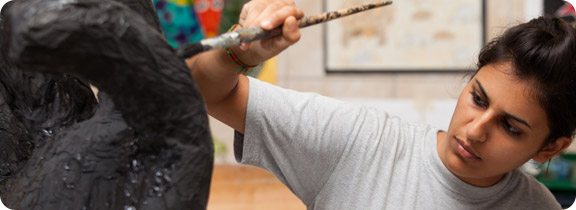
Partnerships
Each Aga Khan Academy benefits from the combined experience of the network of Academies as well as from partnerships with other global networks and institutions. These linkages enable the development and support of world-class standards of excellence.
Aga Khan Development Network
The Aga Khan Academies are one of the key education programmes of the Aga Khan Development Network (AKDN), whose institutions are engaged in a wide array of development initiatives.
AKDN draws on over a century of experience in education from pre-primary to tertiary levels, and includes more than 240 schools and two universities. Students and faculty at each Aga Khan Academy are able to access the intellectual and programmatic resources of AKDN institutions, including the Aga Khan University, the University of Central Asia, the Aga Khan Education Services, the Aga Khan Foundation and the Aga Khan Trust for Culture. The Academies also work in close partnership with AKDN institutions and programmes around the world to provide practical experience opportunities through internships for students and alumni.
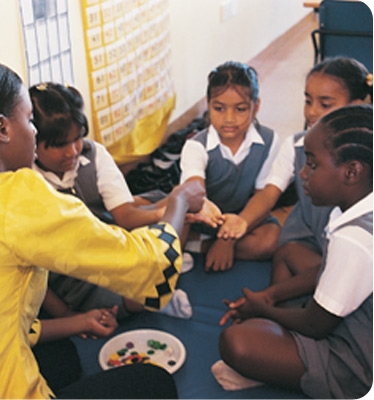
Other leading institutions
The Aga Khan Academies have established formal partnerships with governments, universities and other leading organisations to ensure high standards of practice and foster innovation. Some of the areas that Academies’ partnerships support include best practices in teaching and learning, innovative approaches to teacher education, development of quality campus facilities, supplementary education opportunities for students and access to higher education for talented Academies graduates in need. The Academies have also established partnerships with Ministries and Departments of Education to help strengthen education provision in the countries where our schools are located. Current partners include:
Agencies of the Aga Khan Development Network | International Baccalaureate | Government of Ontario, Canada | Agence Française de Développement | The University of British Columbia Concordia University | California State University, Northridge | Ryerson University | Ministry of Education, Science and Technology, Kenya | Ministry of Education and Human Development, Mozambique | Department of School Education, Telangana, India
In addition, the Academies collaborate with a number of schools and other organisations locally and internationally in areas of mutual interest and to share knowledge and experience.
The IB network
AKDN has a formalised relationship with the International Baccalaureate (IB) through a Memorandum of Understanding between the two organisations.
As IB World Schools, the Academies are closely linked to a network of dynamic IB institutions in over 125 countries, united by a common vision for education and global standards. Guided and facilitated by the IB, this network uses face-to-face conferences and workshops as well as technology to enable teachers and school leaders to gain from each other's experience and to share projects and initiatives.
Ensuring world-class standards
Being connected to these global networks and institutions enables the Academies to test and validate their standards of excellence. These partnerships contribute to the quality of the curriculum and professional development programmes, and ensure that the Academies maintain and enhance their high international standing.
